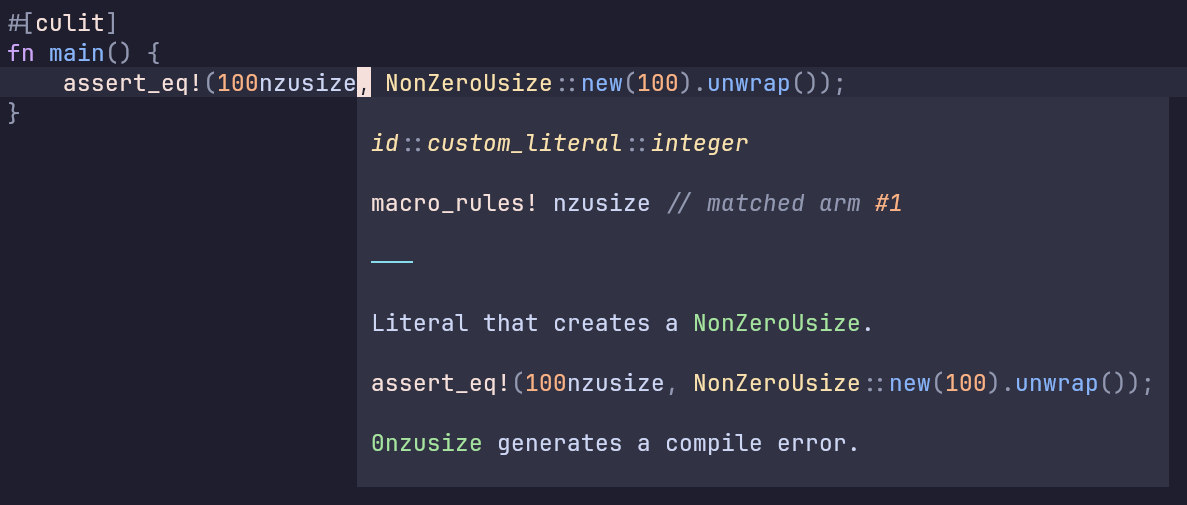Expand description
You probably know that numbers in Rust can be suffixed to specify their type, e.g. 100i32.
But did you know that syntactically any literal can have a suffix? And did you know that the suffix can be whatever you want?
This crate provides an attribute macro #[culit] for “Custom Literals”. When applied to any statement, it enables using custom literals in that statement.
[dependencies]
culit = "0.6"Note: culit does not have any dependencies such as syn or quote, and it is a simple mapping SourceCode -> SourceCode, so compile-speeds will be very fast.
§Example
A NonZeroUsize literal that fails to compile if it is 0: 100nzusize
use culit::culit;
use std::num::NonZeroUsize;
#[culit]
fn main() {
assert_eq!(100nzusize, NonZeroUsize::new(100).unwrap());
// COMPILE ERROR!
// let illegal = 0nzusize;
}
mod custom_literal {
pub mod integer {
macro_rules! nzusize {
// handle `0` specially
(0) => {
compile_error!("`0` is not a valid `NonZeroUsize`")
};
($value:literal) => {
const { NonZeroUsize::new($value).unwrap() }
};
}
pub(crate) use nzusize;
}
}§IDE Support
Hovering over the custom literals shows documentation for the macro that generates them. You can also do “goto definition”. It’s quite nice!

§More Examples
Python-like f-strings: "hello {name}"f
use culit::culit;
#[culit]
fn main() {
let name = "bob";
let age = 23;
assert_eq!(
"hi, my name is {name} and I am {age} years old"f,
format!("hi, my name is {name} and I am {age} years old")
);
}
mod custom_literal {
pub mod string {
macro_rules! f {
($value:literal) => {
format!($value)
};
}
pub(crate) use f;
}
}Duration literals: 100m, 2h…
use culit::culit;
use std::time::Duration;
#[culit]
fn main() {
assert_eq!(
100d + 11h + 8m + 7s,
Duration::from_secs(100 * 60 * 60 * 24)
+ Duration::from_secs(11 * 60 * 60)
+ Duration::from_secs(8 * 60)
+ Duration::from_secs(7)
);
}
// works on functions, constants, modules, everything!
#[culit]
const TIME: Duration = 100d;
mod custom_literal {
pub mod integer {
// day
macro_rules! d {
($value:literal) => {
Duration::from_secs(60 * 60 * 24 * $value)
};
}
pub(crate) use d;
// hour
macro_rules! h {
($value:literal) => {
Duration::from_secs(60 * 60 * $value)
};
}
pub(crate) use h;
// minute
macro_rules! m {
($value:literal) => {
Duration::from_secs(60 * $value)
};
}
pub(crate) use m;
// second
macro_rules! s {
($value:literal) => {
Duration::from_secs($value)
};
}
pub(crate) use s;
}
}The possibilities are endless!
§Details
#[culit] replaces every literal that has a custom suffix with a call to the macro
at crate::custom_literal::<type>::<suffix>!($value), where $value is the literal with the suffix stripped:
| literal | expansion |
|---|---|
100km | crate::custom_literal::integer::km!(100) |
70.008e7feet | crate::custom_literal::float::feet!(70.008e7) |
"foo"bar | crate::custom_literal::string::bar!("foo") |
'a'ascii | crate::custom_literal::character::ascii!('a') |
b"foo"bar | crate::custom_literal::byte_string::bar!(b"foo") |
b'a'ascii | crate::custom_literal::byte_character::ascii!(b'a') |
c"foo"bar | crate::custom_literal::c_string::bar!(c"foo") |
Notes:
- Built-in suffixes like
usizeandf32do not expand, so you cannot overwrite them. - Escapes are fully processed, so there’s no
raw_byte_str.rb#"f\oo"#just becomesb"f\\oo"
§Skeleton
Here’s a skeleton for the custom_literal module which must exist at crate::custom_literal.
This module adds a new literal for every type of literal:
mod custom_literal {
pub mod integer {
macro_rules! custom {
($value:literal) => {
// ...
}
}
pub(crate) use custom;
}
pub mod float {
macro_rules! custom {
($value:literal) => {
// ...
}
}
pub(crate) use custom;
}
pub mod string {
macro_rules! custom {
($value:literal) => {
// ...
}
}
pub(crate) use custom;
}
pub mod character {
macro_rules! custom {
($value:literal) => {
// ...
}
}
pub(crate) use custom;
}
pub mod byte_character {
macro_rules! custom {
($value:literal) => {
// ...
}
}
pub(crate) use custom;
}
pub mod byte_string {
macro_rules! custom {
($value:literal) => {
// ...
}
}
pub(crate) use custom;
}
pub mod c_string {
macro_rules! custom {
($value:literal) => {
// ...
}
}
pub(crate) use custom;
}
}§Custom module
We look for custom literals in the crate::custom_literal module.
You can choose a custom module by passing arguments to the culit macro.
The default usage of #[culit] is identical to #[culit(crate::custom_literal)]
§Nightly
You need to use #[culit] attribute everywhere you want to use these literals. On nightly, you can apply it on the module:
#![feature(custom_inner_attributes)]
#![feature(proc_macro_hygiene)]
#![culit::culit]While this works, I wouldn’t recommend it - currently rust-analyzer is unable to properly work with custom inner attributes
that modify the whole crate. For example, if you write 0nzusize which produces a compiler error, the span of the error will point to
the macro crate::custom_literal::int::nzusize but not the actual 0nzusize, which makes it very hard to debug these
Attribute Macros§
- culit
- Supports using custom literals such as
10kmdefined atcrate::custom_literal::int::km




